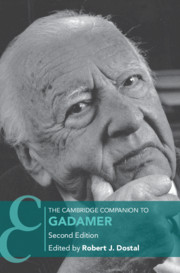Book contents
- The Cambridge Companion to Gadamer
- Other Volumes in the Series of Cambridge Companions
- The Cambridge Companion to Gadamer
- Copyright page
- Contents
- Contributors
- Abbreviations
- Introduction
- 1 Gadamer (1900–2002)
- 2 Gadamer’s Basic Understanding of Understanding
- 3 Getting It Right
- 4 Philosophical Hermeneutics, Language, and the Communicative Event
- 5 Phronesis and Solidarity
- 6 Gadamer’s Herderian Critics
- 7 Gadamer on the Human Sciences
- 8 Art Experience and Its Transformative Potential in Gadamer’s Hermeneutics
- 9 Lyric as Paradigm
- 10 Gadamer, the Hermeneutic Revolution, and Theology
- 11 Hermeneutics in Practice
- 12 Gadamer’s Hegel
- 13 Gadamer’s Relation to Heidegger and to Phenomenology
- 14 The Constellation of Hermeneutics, Critical Theory, and Deconstruction
- 15 Hermeneutics in a Broader Horizon
- Bibliography
- Index
- Other Volumes in the Series of Cambridge Companions (continued from page ii)
Introduction
Published online by Cambridge University Press: 29 July 2021
- The Cambridge Companion to Gadamer
- Other Volumes in the Series of Cambridge Companions
- The Cambridge Companion to Gadamer
- Copyright page
- Contents
- Contributors
- Abbreviations
- Introduction
- 1 Gadamer (1900–2002)
- 2 Gadamer’s Basic Understanding of Understanding
- 3 Getting It Right
- 4 Philosophical Hermeneutics, Language, and the Communicative Event
- 5 Phronesis and Solidarity
- 6 Gadamer’s Herderian Critics
- 7 Gadamer on the Human Sciences
- 8 Art Experience and Its Transformative Potential in Gadamer’s Hermeneutics
- 9 Lyric as Paradigm
- 10 Gadamer, the Hermeneutic Revolution, and Theology
- 11 Hermeneutics in Practice
- 12 Gadamer’s Hegel
- 13 Gadamer’s Relation to Heidegger and to Phenomenology
- 14 The Constellation of Hermeneutics, Critical Theory, and Deconstruction
- 15 Hermeneutics in a Broader Horizon
- Bibliography
- Index
- Other Volumes in the Series of Cambridge Companions (continued from page ii)
Summary
In 1960 Hans-Georg Gadamer, then a sixty-year-old German philosophy professor at Heidelberg, published Truth and Method ( Wahrheit und Methode). Although he had authored many essays, articles, and reviews, to this point Gadamer had published only one other book, his habilitation on Plato in 1931: Plato’s Dialectical Ethics. As a title for this work on a theory of interpretation, he first proposed to his publisher, Mohr Siebeck, “Philosophical Hermeneutics.” The publisher responded that “hermeneutics” was too obscure a term. Gadamer then proposed “Truth and Method” for a work that found, over time, great resonance and made “hermeneutics” and Gadamer’s name commonplace in intellectual circles worldwide. Truth and Method has been translated into many languages, including Chinese and Japanese. It found and still finds a receptive readership, in part, because, as the title suggests, it addresses large and central philosophical issues in an attempt to find a way between or beyond objectivism and relativism, and scientism and irrationalism. He accomplishes this by developing an account of what he takes to be the universal hermeneutic experience of understanding. Understanding, for Gadamer, is itself always a matter of interpretation. Understanding is also always a matter of language.
- Type
- Chapter
- Information
- The Cambridge Companion to Gadamer , pp. 1 - 14Publisher: Cambridge University PressPrint publication year: 2021

